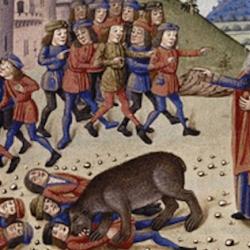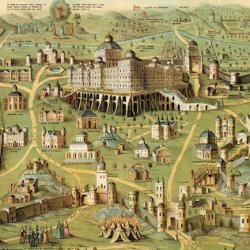A Second Dream, 1 Kings 9:1-28
INTRODUCTION
Solomon?s great building project was the house of Yahweh, which included the temple, the palace, and the government buildings (1 Kings 6-7). But Solomon also built a number of other buildings, fortresses and cities. 1 Kings 9 describes both Yahweh?s response to the temple (vv. 1-9), and the other building projects (vv. 15-19), and is framed by references to Solomon ?finishing?Ethe house (vv. 1, 25).
THE TEXT
?And it came to pass, when Solomon had finished building the house of the Lord and the king?s house, and all Solomon?s desire which he wanted to do, that the Lord appeared to Solomon the second time, as He had appeared to him at Gibeon . . . .?E(1 Kings 9:1-28).
STRUCTURE
Chapter 9 also brings to an end the story of Solomon and Pharaoh?s daughter, first introduced in chapter 3. In fact, the structure of chapter 3 matches that of chapter 9 in a number of details:
Chapter 3 ch 9
Phar?s daughter Lord?s appearance
Sacrifice Phar?s daughter
dream sacrifice
The typology behind this chapter is Adamic. Solomon is the new Adam, exalted as king, living in the vicinity of the Lord?s dwelling. He is told to keep the Lord?s commandments and statutes, and if he fails, curses will come on him. When Pharaoh?s daughter moves into Jerusalem, it is like Eve being brought the Adam in the garden. Solomon, as Yahweh?s son (2 Samuel 7:14), makes a place for his bride as Yahweh made a place for His.
A SECOND DREAM
After the temple is build, Yahweh appears to Solomon in a dream for the second time (cf. 1 Kings 3), as a kind of second witness. There are a number of similarities between the two incidents. In both cases, the Lord gives what Solomon has asked for; in chapter 3, he requests and receives wisdom, and in chapter 9 he requests that the Lord will hear prayers at the temple and the Lord promises to do that. In both cases, the Lord gives more than Sol asked for; He gives riches and long life in addition to wisdom, and in chapter 9 He promises that His eyes will be at the house perpetually, and not merely ?toward?Ethe house. Both appearances include conditional promises from the Lord. Solomon is promised long life if he keeps the Lord?s statutes and commandments (3:14), and in chapter 9 he is promised that the Davidic kingdom will endure if he walks as his father walked.
Yahweh highlights several things in this dream. First, he answers Solomon?s prayer by promising that ?My eyes and My heart will be [at the temple] perpetually (9:3; cf. 8:28-29, 52). As noted last week, the eyes have to do with judgment (Job 34:21; Psalm 66:7; 94:9; Amos 9:4), and a number of passages of Scripture emphasize the comprehensive vision of the heavenly Judge (Proverbs 15:3; 2 Chronicles 16:7ff; Jeremiah 16:16-17; Zechariah 4:10).
Second, Solomon?s obedience or disobedience will decide whether or not there is a king perpetually on the throne of Israel. Israel?s fate turns on Israel?s sins, but Israel?s sins are linked with the sins of the king (v. 6). It seems curious that David provides the standard by which Solomon will be measured. The Lord says that David walked ?in the integrity of heart and uprightness?E(v. 4). This is not a white-washing of David?s sin with Bath-sheba. The key issue for David and Solomon is idolatry; David showed his integrity by worshiping Yahweh exclusively throughout his life.
Third, Yahweh also threatens Solomon and Israel with devastating judgments if they fail to obey. Israel will become a ?proverb and a byword?E(v. 7), her history a parable or cautionary tale about what happens when people abandon Yahweh. They will be subject to taunts from their enemies (cf. Isaiah 14:4ff). Verse 8 says that the temple will become ?high?E(this is the Hebrew; ?heap of ruins?Eis an effort to interpret). Just as the sins of Hophni and Phineas ?became great,?Eso the temple will be ?raised up?Eas an object lesson for the Gentiles.
BUILDING PROJECTS
The ?twenty years?Ein 1 Kings 9:10 can be linked to the ?E80th year?Eof 6:1, so that the ?house of Yahweh?Eis finished 500 years after the exodus. As we have seen, Solomon?s work is also comparable to Joshua?s; in building the house of Yahweh, he is bringing the exodus to full realization and also completing the subjugation of the land begun under Joshua.
When we look at this passage from this angle, some important features emerge. First, verses 15-25 form a neat section:
a. House of Yahweh (in list), v. 15
b. Millo, v. 15
c. Pharaoh?s conquest of Gezer: gift to daughter (a ?going-away gift?E, v. 16
d. Solomon?s building, vv. 17-19
e. Canaanites were not destroyed: forced labor, vv. 20-21
d?E Not slaves of sons of Israel, vv 22-23
c?E Pharaoh?s daughter into house, v. 24
b?E Millo, v. 24
a?E Finished house, v. 25
Pharaoh destroys a Canaanite city with fire, and then kills the Canaanites. Pharaoh is carrying on a holy war, conquering the land as Israel was commanded to conquer in the time of Joshua. Solomon?s father (-in-law) conquers a town, and gives the town to his daughter, which his son-in-law rebuilds. So also, the Father gives the world to the church, the bride of His Son. Pharaoh?s daughter is also a sign of the future incorporation of the Gentiles into the marital covenant with Yahweh.
At the center of the passage is a contrast with Israel, which does not wipe out the Canaanites. Israel too came from Egypt, but even as late as Solomon?s reign there is a city not far from Jerusalem (Gezer) that was never conquered. Pharaoh is proving himself more an Israelite than Israel, carrying on holy war. Also, the fact that Pharaoh is fighting against Canaanites just outside Jerusalem is odd, as is the fact that Solomon is giving away cities to Hiram in Galilee. The allusions to the conquest end up ironic; this is not a new conquest but the beginning of a reversal of the conquest, as bits of land are chipped away from Israel.
Finally, Solomon has cities for chariots and horsemen (v. 19). The multiplication of chariots and horsemen is one of the big prohibitions for kings, and in Deuteronomy 17 multiplying horses is directly linked with Egyptian-like rule. It was fine for Solomon to take a wife from Egypt (as Joseph did), but he is beginning to act like a Pharaoh, while Pharaoh, ironically, is acting like Joshua. Solomon?s reign is still glorious, but there are increasing signs that something is amiss.















